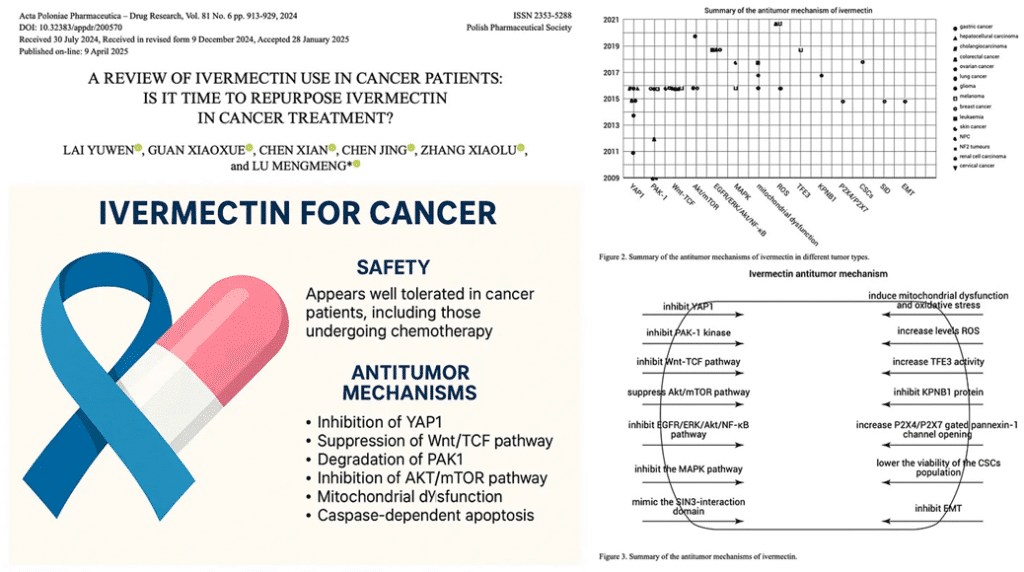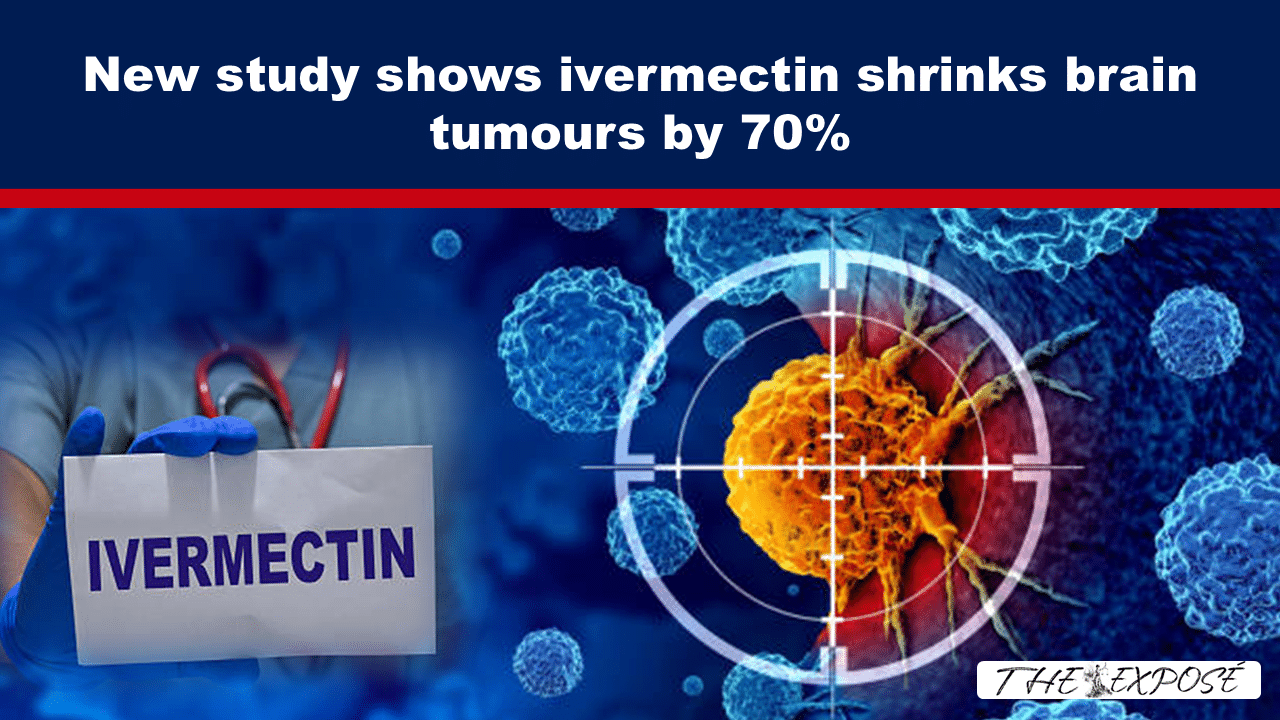Glioblastoma is the most common and aggressive type of primary malignant brain tumour in adults. All glioblastomas are classified as WHO grade 4, indicating rapid growth, extensive invasion into surrounding brain tissue and poor prognosis.
An animal study in June demonstrated that a nano-formulated ivermectin delivered intranasally shrank brain tumours by 70% after just 10 days of treatment.
As Nicolas Hulscher points out, the studyâs findings align with ivermectinâs 14 distinct anti-cancer mechanisms.
Let’s not lose touch…Your Government and Big Tech are actively trying to censor the information reported by The ExposĂ© to serve their own needs. Subscribe to our emails now to make sure you receive the latest uncensored news in your inbox…
A few days ago, Nicolas Hulscher joined Andrew Nam, host of the Chronically Healthy Life Show, to discuss turbo cancers. We have embedded the video below to begin at timestamp 42:34, when Hulscher discussed ivermectin. This section of the interview is relevant to an article Hulscher had posted a few days before, which we have republished below.
If you are unable to watch the video above on Rumble, you can watch it on YouTube HERE.
New Study: Intranasal Nano-Ivermectin Shrinks Brain Tumours by 70% Without Toxicity
By Nicolas Hulscher, as published by Focal Points on 10 October 2025
A groundbreaking preclinical study published in ACS Biomaterials Science & Engineering has revealed that nano-formulated ivermectin delivered intranasally reduced glioblastoma tumour size by 70% – at a dose lower than the approved human antiparasitic dose – all without a trace of toxicity in the brain, blood or lungs.

Glioblastoma is one of the deadliest and most treatment-resistant cancers on earth, with a median survival of under 15 months. The bloodâbrain barrier blocks most drugs from reaching the tumour.
Researchers from the Federal University of Rio Grande do Sul (Brazil) engineered ivermectin nanocapsules (âIVM-NCâ) using biodegradable, biocompatible polymers commonly employed in dissolvable sutures and medical implants, and administered them intranasally to rats bearing brain tumours.

DOI 101021acsbiomaterials5c00642
This ânose-to-brainâ delivery allowed the drug to bypass the bloodâbrain barrier entirely, directly targeting the tumour site.
Tumour Size Reduced by 70%
After just 10 days of treatment:
- Control tumours averaged 254 mm³.
- IVM-NC tumours averaged only 79 mm³ – a 70% reduction in size, confirmed by histopathology.
- Non-encapsulated (free) ivermectin – given the same intranasal route – had no measurable effect.

DOI 101021acsbiomaterials5c00642
Microscopic analysis revealed that both ivermectin-treated groups – the free ivermectin and the nano-formulated ivermectin – showed reductions in necrosis, peritumoral oedema and vascular proliferation compared with controls.
This marks the first in vivo evidence that ivermectin, when properly formulated and delivered, can drastically suppress glioblastoma growth at doses far below standard antiparasitic levels.
Zero Detectable Toxicity
At the same time, the nano-formulated ivermectin showed no adverse effects:
- No changes in body weight, liver or kidney markers.
- No lung inflammation, haemorrhage, or oedema.
- No cytotoxicityin normal fibroblast cell lines.
- Even at repeated daily doses, the treatment remained completely well-tolerated.
By contrast, the non-nano (free) ivermectin and silica nanoparticle formulations both caused tissue irritation and cell death at higher concentrations.

These findings align with ivermectinâs 14 distinct anti-cancer mechanisms summarised by Yuwen et al., encompassing inhibition of oncogenic signalling (YAP1, WntâTCF, Akt/mTOR, EGFR/NF-ÎșB, MAPK), mitochondrial and oxidative-stress induction, ion-channel modulation and suppression of both cancer stem cells and the epithelialâmesenchymal transition (âEMTâ).
Read more: New Study – Ivermectin Shows Striking Anticancer Potential and Remarkable Safety, Nicolas Hulscher, 22 April 2025

By hitting multiple hallmarks of cancer simultaneously – proliferation, metabolism, invasion and survival – ivermectin appears to function as a multi-targeted anti-tumour agent. In glioblastoma, these converging effects explain the 70% tumour-volume reduction observed with intranasal nano-ivermectin, achieved at doses below standard antiparasitic levels and without toxicity.
Clinical translation in humans is urgently needed. Encouragingly, this effort may already be underway. On 24 September 2025, Governor Ron DeSantis and First Lady Casey DeSantis announced a $60 million funding opportunity through the Florida Cancer Innovation Fund, prioritising translational cancer research, short-duration clinical trials and the repurposing of safe, generic drugs such as ivermectin for cancer treatment.
About the Author
Nicolas Hulscher, Master of Public Health (MPH), is an epidemiologist and Administrator at the McCullough Foundation, which publishes articles on a Substack page titled âFocal Pointsâ.
Hulscher is known for his research on adverse events following covid vaccination, particularly focusing on myocarditis and other post-acute sequelae. He has been the lead author on several covid vaccination studies and a contributor to others. He has also co-authored research on the proximal origin of highly pathogenic avian influenza H5N1.

The Expose Urgently Needs Your Help…
Can you please help to keep the lights on with The Expose’s honest, reliable, powerful and truthful journalism?
Your Government & Big Tech organisations
try to silence & shut down The Expose.
So we need your help to ensure
we can continue to bring you the
facts the mainstream refuses to.
The government does not fund us
to publish lies and propaganda on their
behalf like the Mainstream Media.
Instead, we rely solely on your support. So
please support us in our efforts to bring
you honest, reliable, investigative journalism
today. Itâs secure, quick and easy.
Please choose your preferred method below to show your support.
Categories: Breaking News, World News

Dr William Makis is treating cancer patients around the world with Ivermectin, Fenbendazole and Mebendazole, he has saved many lives this way.
Hello,
It would be nice if someone can point to were this ca be bought in th uk ?
Hi Dan, you can order it online and they will post it you.
in canakastan you need a registered account that is numbered to purchase ( ranchers , farmers for now )
Hi History, have you tried the website below?
https://www.ziverdokit.store/
Thank you for your reply.
Iâve heard that the human form of ivermectin is âstromectolâ, if that helps at all.
Nano-formulated? Is this so that they can patent the ‘nano-formulated’ ivermectin and charge a fortune for it? I’d heard that ordinary ivermectin pills taken orally get rid of tumours in the brain, bone or elsewhere.
Fenbendazole is easier to get hold of – does it work the same way?